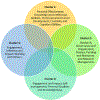Transfusion medicine research in Africa: Insights from investigators in the field
- PMID: 36734301
- PMCID: PMC11005390
- DOI: 10.1111/vox.13407
Transfusion medicine research in Africa: Insights from investigators in the field
Abstract
Background and objectives: Research in low-resource settings is inherently challenging. We sought to assess the factors that have impeded or facilitated transfusion medicine (TM) research in various African settings.
Materials and methods: A qualitative case study was conducted of selected investigators in Africa; selection was based on productivity-spanning publication, leadership and research in TM. We designed a questionnaire to explore the factors impeding or facilitating TM research to understand the impact on the investigators' careers. Written responses were independently coded and double-checked for precision. Qualitative analysis was conducted, whereby responses were grouped thematically and clustered by relationship. The initial findings were discussed with respondents to validate and refine the interpretations. The recorded transcript was analysed and incorporated into the final analysis.
Results: Six investigators participated in the study. Their responses yielded 471 coded comments: 389 from the questionnaires and 82 from the ensuing discussion. The most frequently cited factors described included knowledge and intellectual abilities (n = 104), personal effectiveness (n = 99), research and governance structure (n = 97), and engagement, influence and impact (n = 75). Four relationship clusters emerged from the facilitators (n = 42), barriers (n = 28), and common approaches (n = 26) to research, informing summary themes of adaptation, collaboration, perseverance, and resiliency.
Conclusion: Individual attributes were found to be central to a successful TM research career in African settings. However, given other public health priorities and constraints, interpersonal relationships, organizational structures and the broader research context were important to TM researchers. Overcoming complexities demands adaptation, collaboration, perseverance and resiliency.
Keywords: Africa; qualitative research; transfusion medicine.
© 2023 The Authors. Vox Sanguinis published by John Wiley & Sons Ltd on behalf of International Society of Blood Transfusion.
Conflict of interest statement
CONFLICT OF INTEREST STATEMENT
E.M.B. is a member of the US Food and Drug Administration (FDA) Blood Products Advisory Committee. Any views or opinions expressed in this article are Dr Bloch’s and are based on his own scientific expertise and professional judgement; they do not necessarily represent the views of the Blood Products Advisory Committee or the formal position of the FDA and also do not bind or otherwise obligate or commit either the Advisory Committee or the FDA to the views expressed. T.S.I. is a consultant for Terumo Blood and Cell Technologies and Alexion, Inc. L.S.B. is a consultant to the Association for the Advancement of Blood and Biotherapies.
Figures



References
-
- Weimer A, Tagny CT, Tapko JB, Gouws C, Tobian AAR, Ness PM, et al. Blood transfusion safety in sub-Saharan Africa: a literature review of changes and challenges in the 21st century. Transfusion. 2019;59:412–27. - PubMed
-
- Ifland L, Bloch EM, Pitman JP. Funding blood safety in the 21st century. Transfusion. 2018;58:105–12. - PubMed
MeSH terms
Grants and funding
LinkOut - more resources
Full Text Sources

